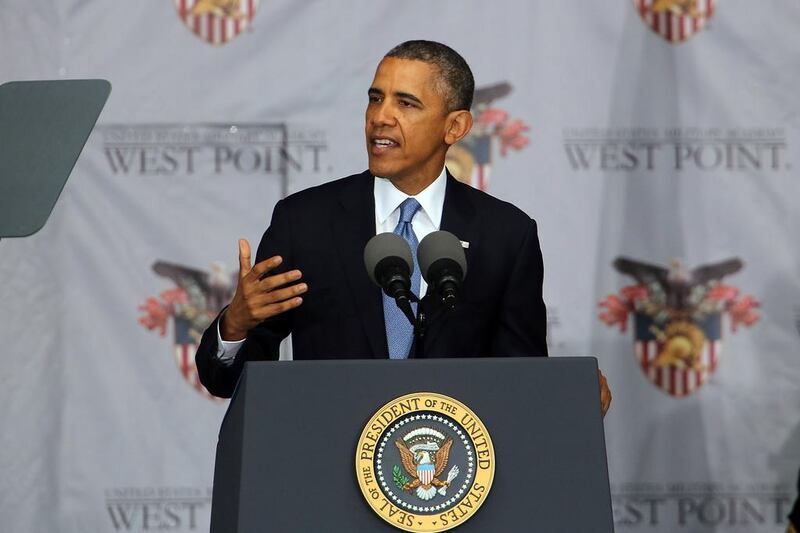Just when he thought he was out, they pull him back in. Barack Obama must have thought his West Point speech on foreign policy last month could not have been clearer. Low on detail, perhaps, but high on political realism (yes to diplomacy and internationalism, no to isolationism), his speech proclaiming a "new stage" in the foreign policy of the superpower was designed to set out his stall ahead of the 2016 election.
Unfortunately, the world does not follow America's election schedule.
Until a few days ago, with approximately a year to go before a new Democratic presidential candidate has to introduce themselves to US voters, Mr Obama was in a good position to say to Americans that he had broken with the Bush era. That a war-weary US had proclaimed: no more wars.
And then the jihadis began their march to Baghdad.
Now, Mr Obama finds himself under fire, accused of pulling America's troops out of Iraq too soon and accused of not sending them into Syria swiftly enough. What is the most realist president for decades meant to do in an age of ideology?
Because Mr Obama's realist politics are not merely making US allies less safe, they are making America less safe as well.
Since he took office, Mr Obama has pursued a doctrine of being anyone but Bush. The ill-formed grand ideas of his predecessor and his use of overwhelming military force to accomplish them have no place in Mr Obama's White House.
His political realism, of seeing the world through a narrow lens of US interests and a limit on the ability of US actions, tallied well with a time of limited economic means.
In contrast to Mr Bush's big wars, including taking the US into what is the longest war in its history, Mr Obama massively expanded non-conventional warfare. Pakistan, Yemen and Somalia have all felt the effects of drone warfare but few boots on the ground.
In Libya, he led from behind only once he was sure other allies were ahead of him. With Iran, he has talked and talked, even over the objections of Israel and Saudi Arabia. He has left other allies to deal with the consequences of a forceful China and aggressive Russia. And he was determined, even against his own advisers, to set a timetable and bring US troops home from Bush's wars.
But unfortunately, neither does the world follow America's political priorities.
If Bush's policy was too broad, Mr Obama's has been too narrow at a time of immense change and upheaval.
It would be reductive to blame America for all that is happening in Iraq and Syria. There is, after all, much blame to go around.
But a policy of disengagement is still a policy and Mr Obama's rush to pull the US out of the world has created a vacuum of power – not leadership, power – that has been filled by competing forces. That has occurred across the world, not merely in the Middle East; the eastern fringes of Europe have felt it and allies around the South China Sea have felt it. Once US troops leave Afghanistan, expect Central Asian allies to feel it too.
That policy of disengagement is no longer working. In the Middle East, it is threatening to undo what the US created in Iraq with the loss of so much blood and treasure. It is also threatening long-standing US allies: the arrival of hundreds of thousands of refugees is straining Jordan. The instability in Iraq is threatening Saudi Arabia: a few months ago, Iraqi militants fired mortars into Saudi territory.
And the policy of disengagement is making America itself less safe, creating ungoverned spaces in the wide lands across Syria and Iraq, from where militants can plan attacks against the US and Europe – as, indeed, they have expressed a desire to do.
Today, hard realism should compel Mr Obama to get involved in the two wars that are becoming one theatre.
Even purely from political calculation, getting involved in Iraq and Syria is the right decision. Mr Obama may hope he can see out the next two years without any great challenges. But he is likely to be proved wrong. The Republicans have sought to pin blame both for the death of the US ambassador in Libya and the swap of Bowe Berghdahl for five Guantanamo Bay inmates at his door. All it would take is another hostage situation – or worse – to gift his opponents a big stick with which to attack his record.
Mr Obama's instinctive hard realism about the limits of hard power is politically sound. But during his presidency, with the legacy of Iraq and Afghanistan, these limits have been drawn ever tighter, to the point where reluctance to act becomes refusal.
Despite saying that he believes the US should only act in concert with allies, Mr Obama has been reluctant to act even when those conditions have been met.
Stepping back from getting involved in Syria after Assad used chemical weapons was not because America did not want to act alone, but because it did not want to act at all. Other allies were ready to act.
The same applies to Iraq. When Nouri Al Maliki asked the US for air strikes against ISIL last month, he was asking for assistance in concert with Iraqi troops. He was rebuffed.
Political realism, as expressed in his West Point speech, requires action when inaction is worse. In Iraq and Syria, those conditions have been met.
falyafai@thenational.ae
On Twitter: @FaisalAlYafai
Obama’s ‘no more war’ policy leaves America vulnerable
The wars in Iraq and Syria are making the Middle East more dangerous - and America itself less safe, writes Faisal Al Yafai

Editor's picks
More from the national





